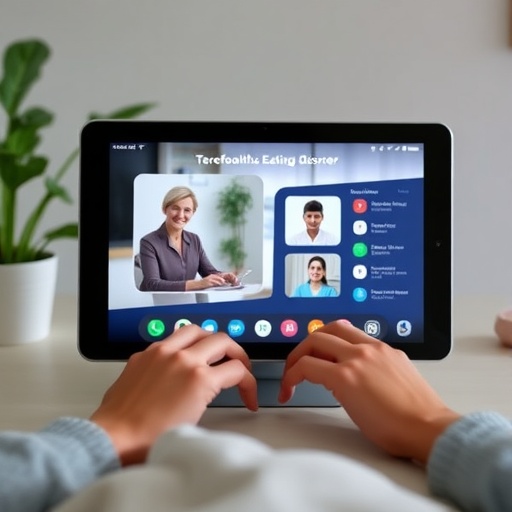A systematic review and meta analysis on digital mental health interventions in inpatient settings

Borges, G. et al. Twelve-month prevalence of and risk factors for suicide attempts in the World Health Organization World Mental Health Surveys. J. Clin. Psychiatry 71, 1617–1628 (2010).
Google Scholar
Doran, C. M. & Kinchin, I. A review of the economic impact of mental illness. Aust. Health Rev. 43, 43 (2019).
Google Scholar
Vos, T. et al. Global, regional, and national incidence, prevalence, and years lived with disability for 328 diseases and injuries for 195 countries, 1990–2016: A systematic analysis for the global burden of disease study 2016. Lancet 390, 1211–1259 (2017).
Santomauro, D. F. et al. Global prevalence and burden of depressive and anxiety disorders in 204 countries and territories in 2020 due to the COVID-19 pandemic. Lancet 398, 1700–1712 (2021).
Ahmed, N. et al. Mental health in Europe during the COVID-19 pandemic: A systematic review. Lancet Psychiatry 10, 537–556 (2023).
Google Scholar
Alonso, J. et al. Prevalence of mental disorders in Europe: Results from the European study of the epidemiology of Mental Disorders (esemed) project. Acta Psychiatr. Scandinavica 109, 21–27 (2004).
Sacco, R., Camilleri, N., Eberhardt, J., Umla-Runge, K. & Newbury-Birch, D. A systematic review and meta-analysis on the prevalence of mental disorders among children and adolescents in Europe. European Child & Adolescent Psychiatry (2022).
Wittchen, H. U. et al. The size and burden of mental disorders and other disorders of the brain in Europe 2010. Eur. Neuropsychopharmacol. 21, 655–679 (2011).
Google Scholar
Zuberi, A. et al. Prevalence of mental disorders in the WHO Eastern Mediterranean Region: A systematic review and meta-analysis. Front. Psychiatry 12, (2021).
Jacobi, F. et al. Psychische Störungen in der Allgemeinbevölkerung. Der Nervenarzt 85, 77–87 (2014).
Google Scholar
Andrade, L. H. et al. Barriers to mental health treatment: Results from the WHO World Mental Health Surveys. Psychol. Med. 44, 1303–1317 (2013).
Google Scholar
EU-Compass for action on Mental Health and well-being. Public Health Available at: (Accessed: 21st May 2024).
Koopmanschap, M. A., Brouwer, W. B. F., Hakkaart-van Roijen, L. & van Exel, N. J. A. Influence of waiting time on cost-effectiveness. Soc. Sci. Med. 60, 2501–2504 (2005).
Google Scholar
Reichert, A. & Jacobs, R. The impact of waiting time on patient outcomes: Evidence from early intervention in psychosis services in England. Health Econ. 27, 1772–1787 (2018).
Google Scholar
van Dijk, D. A. et al. Worse off by waiting for treatment? the impact of waiting time on clinical course and treatment outcome for depression in routine care. J. Affect. Disord. 322, 205–211 (2023).
Google Scholar
Sherman, M. L., Barnum, D. D., Buhman-Wiggs, A. & Nyberg, E. Clinical intake of child and adolescent consumers in a rural community mental health center: Does wait-time predict attendance? Community Ment. Health J. 45, 78–84 (2008).
Google Scholar
Williams, M. E., Latta, J. & Conversano, P. Eliminating the wait for Mental Health Services. J. Behav. Health Serv. Res. 35, 107–114 (2007).
Google Scholar
Köhnen, M., Dirmaier, J. & Härter, M. Potenziale und Herausforderungen von E-mental-health-interventionen in der Versorgung Psychischer störungen. Fortschr. der Neurologie · Psychiatr. 87, 160–164 (2019).
Weitzel, E. C. et al. E-mental health in Germany — what is the current use and what are experiences of different types of health care providers for patients with mental illnesses? Arch. Public Health 81, 1–6 (2023).
Bolinski, F. et al. The effect of E-mental health interventions on academic performance in university and college students: A meta-analysis of randomized controlled trials. Internet Interventions 20, 100321 (2020).
Google Scholar
Firth, J. et al. Can smartphone mental health interventions reduce symptoms of anxiety? A meta-analysis of randomized controlled trials. J. Affect. Disord. 218, 15–22 (2017).
Google Scholar
Linardon, J. et al. Current evidence on the efficacy of mental health smartphone apps for symptoms of depression and anxiety. A meta‐analysis of 176 randomized controlled trials. World Psychiatry 23, 139–149 (2024).
Google Scholar
Linardon, J., Shatte, A., Messer, M., Firth, J. & Fuller-Tyszkiewicz, M. E-mental health interventions for the treatment and prevention of eating disorders: An updated systematic review and meta-analysis. J. Consulting Clin. Psychol. 88, 994–1007 (2020).
Simblett, S., Birch, J., Matcham, F., Yaguez, L. & Morris, R. A systematic review and meta-analysis of E-mental health interventions to treat symptoms of posttraumatic stress. JMIR Mental Health 4, (2017).
Stratton, E. et al. Effectiveness of ehealth interventions for reducing mental health conditions in employees: A systematic review and meta-analysis. PLOS ONE 12, (2017).
Löbner, M. et al. What comes after the trial? an observational study of the real-world uptake of an e-mental health intervention by general practitioners to reduce depressive symptoms in their patients. Int. J. Environ. Res. Public Health 19, 6203 (2022).
Google Scholar
Rost, T. et al. User acceptance of computerized cognitive behavioral therapy for depression: Systematic review. Journal of Medical Internet Research 19, (2017).
Wangler, J. & Jansky, M. How can primary care benefit from Digital Health Applications? – a quantitative, explorative survey on attitudes and experiences of General Practitioners in Germany. BMC Digital Health 2, 1–14 (2024).
Zipfel, S., Herzog, W., Kruse, J. & Henningsen, P. Psychosomatic medicine in Germany: More timely than ever. Psychother. Psychosom. 85, 262–269 (2016).
Google Scholar
Franz, M. et al. Stationäre Tiefenpsychologisch Orientierte psychotherapie bei Depressiven Störungen (stop-D) – erste befunde einer naturalistischen, multizentrischen Wirksamkeitsstudie. Z. f.ür. Psychosomatische Med. und Psychotherapie 61, 19–35 (2015).
Gönner, S., Bischoff, C., Ehrhardt, M. & Limbacher, K. Effekte therapiezielorientierter Kognitiv-Verhaltenstherapeutischer Nachsorgemaßnahmen auf den therapietransfer im Anschluss an eine Stationäre psychosomatische Rehabilitationsbehandlung. Die Rehabilitation 45, 369–376 (2006).
Google Scholar
Zeeck, A., Wietersheim, Jvon, Weiss, H., Beutel, M. & Hartmann, A. The INDDEP Study: Inpatient and day hospital treatment for depression – symptom course and predictors of change. BMC Psychiatry 13, 100 (2013).
Google Scholar
Giel, K. E. et al. Efficacy of post-inpatient aftercare treatments for anorexia nervosa: A systematic review of randomized controlled trials. J. Eat. Disord. 9, 129 (2021).
Google Scholar
Hegedüs, A., Kozel, B., Richter, D. & Behrens, J. Effectiveness of transitional interventions in improving patient outcomes and service use after discharge from psychiatric inpatient care: A systematic review and meta-analysis. Front. Psychiatry 10, 969 (2020).
Google Scholar
Vittengl, J. R., Clark, L. A., Dunn, T. W. & Jarrett, R. B. Reducing relapse and recurrence in Unipolar Depression: A comparative meta-analysis of cognitive-behavioral therapy’s effects. J. Consulting Clin. Psychol. 75, 475–488 (2007).
Sharma, G. et al. Brief app-based cognitive behavioral therapy for anxiety symptoms in psychiatric inpatients: Feasibility randomized controlled trial. JMIR Formative Res. 6, e38460 (2022).
Zwerenz, R. et al. Transdiagnostic, psychodynamic web-based self-help intervention following inpatient psychotherapy: Results of a feasibility study and randomized controlled trial. JMIR Ment. Health 4, e41 (2017).
Google Scholar
Hennemann, S., Farnsteiner, S. & Sander, L. Internet- and Mobile-based aftercare and relapse prevention in mental disorders: A systematic review and recommendations for Future Research. Internet Interventions 14, 1–17 (2018).
Google Scholar
Cochrane Handbook for Systematic Reviews of interventions. (Cochrane, 2019).
Kordy, H. et al. Internet-delivered disease management for recurrent depression: A multicenter randomized controlled trial. Psychother. Psychosom. 85, 91–98 (2016).
Google Scholar
Jacobi, C. et al. Web-based aftercare for women with bulimia nervosa following inpatient treatment: Randomized controlled efficacy trial. J. Med. Internet Res. 19, e321 (2017).
Google Scholar
Gallinat, C. et al. Feasibility of an intervention delivered via mobile phone and internet to improve the continuity of care in schizophrenia: A randomized controlled pilot study. Int. J. Environ. Res. Public Health 18, 12391 (2021).
Google Scholar
Nolte, S. et al. Do sociodemographic variables moderate effects of an internet intervention for mild to moderate depressive symptoms? an exploratory analysis of a randomised controlled trial (evident) including 1013 participants. BMJ Open 11, e041389 (2021).
Google Scholar
Abadi, M. et al. Achieving whole health: A preliminary study of TCMLH, a group-based program promoting self-care and empowerment among veterans. Health Educ. Behav. 49, 347–357 (2021).
Google Scholar
Becker, J., Kreis, A., Beutel, M. E. & Zwerenz, R. Wirksamkeit der Internetbasierten, Berufsbezogenen Nachsorge GSA-online im Anschluss an die stationäre psychosomatische Rehabilitation: Ergebnisse einer randomisiert Kontrollierten Studie. Die Rehabilitation 61, 276–286 (2022).
Google Scholar
Gulec, H. et al. A randomized controlled trial of an internet-based posttreatment care for patients with eating disorders. Telemed. e-Health 20, 916–922 (2014).
Bruhns, A., Lüdtke, T., Moritz, S. & Bücker, L. A mobile-based intervention to increase self-esteem in students with depressive symptoms: Randomized controlled trial. JMIR mHealth uHealth 9, e26498 (2021).
Google Scholar
Borenstein, M. Computing effect sizes for meta-analysis. (Wiley-Blackwell, 2011).
Philippe, T. J. et al. Digital Health Interventions for delivery of mental health care: Systematic and comprehensive meta-review. JMIR Ment. Health 9, e35159 (2022).
Google Scholar
Välimäki, M., Kannisto, K. A., Vahlberg, T., Hätönen, H. & Adams, C. E. Short text messages to encourage adherence to medication and follow-up for people with psychosis (mobile.net): Randomized controlled trial in Finland. J. Med. Internet Res. 19, e245 (2017).
Google Scholar
Alvarez‐Jimenez, M. et al. The Horyzons Project: A randomized controlled trial of a novel online social therapy to maintain treatment effects from specialist first‐episode psychosis services. World Psychiatry 20, 233–243 (2021).
Google Scholar
Clarke, S., Hanna, D., Mulholland, C., Shannon, C. & Urquhart, C. A systematic review and meta-analysis of digital health technologies effects on psychotic symptoms in adults with psychosis. Psychosis 11, 362–373 (2019).
Bauer, S., Okon, E., Meermann, R. & Kordy, H. Technology-enhanced maintenance of treatment gains in eating disorders: Efficacy of an intervention delivered via text messaging. J. Consulting Clin. Psychol. 80, 700–706 (2012).
Bauer, S., Okon, E., Meermann, R. & Kordy, H. SMS-Nachsorge: Sektorenübergreifende Versorgung für patientinnen mit bulimia nervosa. Verhaltenstherapie 23, 204–209 (2013).
Fichter, M. M., Quadflieg, N. & Lindner, S. Internet-based relapse prevention for anorexia nervosa: Nine- month follow-up. J. Eat. Disord. 1, 23 (2013).
Google Scholar
Neumayr, C., Voderholzer, U., Tregarthen, J. & Schlegl, S. Improving aftercare with technology for anorexia nervosa after intensive inpatient treatment: A pilot randomized controlled trial with a therapist‐guided smartphone app. Int. J. Eat. Disord. 52, 1191–1201 (2019).
Google Scholar
Fichter, M. M. et al. Does internet-based prevention reduce the risk of relapse for anorexia nervosa? Behav. Res. Ther. 50, 180–190 (2012).
Google Scholar
Ebert, D., Tarnowski, T., Gollwitzer, M., Sieland, B. & Berking, M. A transdiagnostic internet-based maintenance treatment enhances the stability of outcome after inpatient cognitive behavioral therapy: A randomized controlled trial. Psychother. Psychosom. 82, 246–256 (2013).
Google Scholar
Harrington, K. F. et al. Web-based smoking cessation intervention that transitions from inpatient to outpatient: Study protocol for a randomized controlled trial. Trials 13, 123 (2012).
Google Scholar
Kernebeck, S., Busse, T. S., Ehlers, J. P. & Vollmar, H. C. Adhärenz digitaler Interventionen im Gesundheitswesen: Definitionen, Methoden und offene Fragen [Adherence to digital health interventions: definitions, methods, and open questions]. Bundesgesundheitsblatt Gesundheitsforschung Gesundheitsschutz 64, 1278–1284 (2021). OctGermanEpub 2021 Sep 24. PMID: 34559252; PMCID: PMC8492574.
Google Scholar
Sieverink, F., Kelders, S. M. & van Gemert-Pijnen, J. E. Clarifying the Concept of Adherence to eHealth Technology: Systematic Review on When Usage Becomes Adherence. J. Med Internet Res 19, e402 (2017). Dec 6PMID: 29212630; PMCID: PMC5738543.
Google Scholar
Beatty, L. & Binnion, C. A Systematic Review of Predictors of, and Reasons for, Adherence to Online Psychological Interventions. Int J. Behav. Med 23, 776–794 (2016). DecPMID: 26957109.
Google Scholar
Eysenbach, G. The law of attrition. J. Med. Internet Res. 7, e11 (2005). Mar 31PMID: 15829473; PMCID: PMC1550631.
Google Scholar
Norlund, F. et al. Internet-based cognitive behavioral therapy for symptoms of depression and anxiety among patients with a recent myocardial infarction: The U-CARE heart randomized controlled trial. J. Med. Internet Res. 20, e88 (2018).
Google Scholar
Holländare, F. et al. Randomized trial of internet-based relapse prevention for partially remitted depression. Acta Psychiatr. Scandinavica 124, 285–294 (2011).
Zwerenz, R. et al. Online self-help as an add-on to inpatient psychotherapy: Efficacy of a new blended treatment approach. Psychother. Psychosom. 86, 341–350 (2017).
Google Scholar
Ebert, D. D. et al. Internet- and mobile-based psychological interventions: Applications, efficacy, and potential for improving mental health. Eur. Psychologist 23, 167–187 (2018).
Weitzel, E. C. et al. E-mental-health und Digitale Gesundheitsanwendungen in Deutschland. Der Nervenarzt 92, 1121–1129 (2021).
Google Scholar
Page, M. J. et al. The Prisma 2020 statement: An updated guideline for reporting systematic reviews. BMJ. (2021).
Harrer, M., Cuijpers, P., Furukawa, T. A. & Ebert, D. D. Doing meta-analysis with R (2021).
Viechtbauer, W. Conducting meta-analyses inrwith themetaforpackage. J. Stat. Softw. 36, (2010).
Bischoff, C. et al. Wirksamkeit von Handheld-Gestütztem Selbstmanagement (e-coaching) in der rehabilitationsnachsorge. Verhaltenstherapie 23, 243–251 (2013).
Ebert, D. et al. Web-basierte rehabilitationsnachsorge nach stationärer Psychosomatischer Therapie (W-rena). Die Rehab. 52, 164–172 (2013).
Google Scholar
Schmädeke, S. & Bischoff, C. Wirkungen smartphonegestützter Psychosomatischer Rehabilitationsnachsorge (eATROS) Bei depressiven Patienten. Verhaltenstherapie 25, 277–286 (2015).
Willems, R. A. et al. Short‐term effectiveness of a web‐based tailored intervention for cancer survivors on quality of life, anxiety, depression, and fatigue: Randomized controlled trial. Psycho-Oncol. 26, 222–230 (2016).
Zwerenz, R. et al. Evaluation of a transdiagnostic psychodynamic online intervention to support return to work: A randomized controlled trial. PLOS ONE 12, e0176513 (2017).
Google Scholar
Schlicker, S., Ebert, D. D., Middendorf, T., Titzler, I. & Berking, M. Evaluation of a text-message-based maintenance intervention for major depressive disorder after inpatient cognitive behavioral therapy. J. Affect. Disord. 227, 305–312 (2018).
Google Scholar
Zwerenz, R. et al. Improving the Course of Depressive Symptoms After Inpatient Psychotherapy Using Adjunct Web-Based Self-Help: Follow-Up Results of a Randomized Controlled Trial. J. Med. Internet Res. 21, e13655 (2019).
Google Scholar
Shaygan, M., Yazdani, Z. & Valibeygi, A. The effect of online multimedia psychoeducational interventions on the resilience and perceived stress of hospitalized patients with COVID-19: A pilot cluster randomized parallel-controlled trial. BMC Psychiatry 21, 93 (2021).
Google Scholar
Levis, M. et al. An implementation and effectiveness study evaluating Conflict Analysis in VA residential substance abuse services: Whole health informed self-guided online care. EXPLORE 18, 688–697 (2022).
Google Scholar
link








